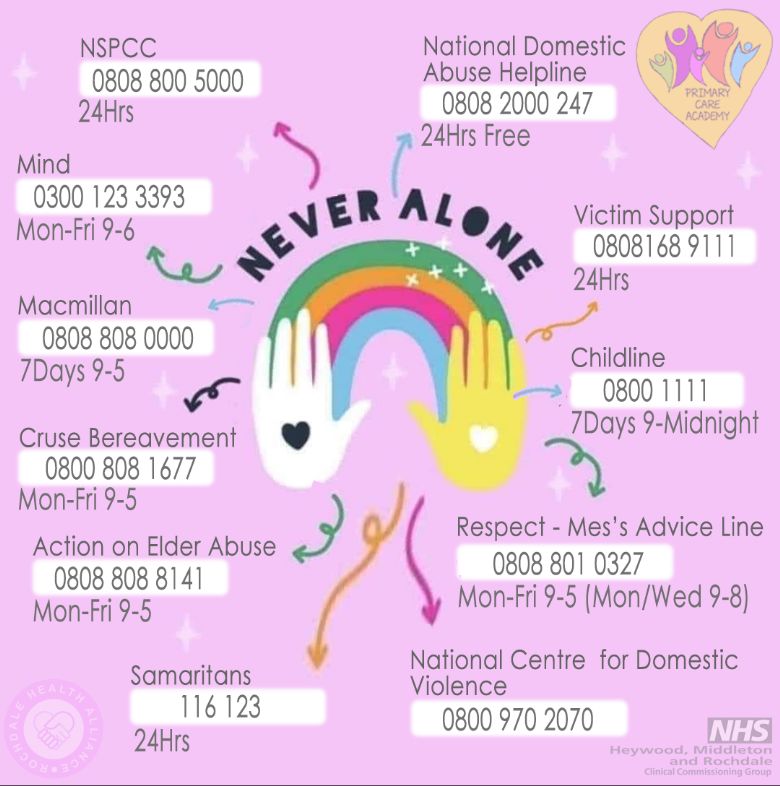Support for Learners
Higher education students and trainees are viewed as ‘independent learners’. However, being independent does not mean being left on your own. Students on our foundation and top-up degreecourses are able to access a wide range of support from the University of Worcester.
Firstpoint: Information and support for students during their studies. Email firstpoint@worc.ac.uk or call 01905 542551.
Library Services: Online resources including e-books and journals, support with referencing and subject specific guides.
Mental Health: Students who are not already allocated to a particular member of the Counselling and Mental Health team or who want to speak to someone more urgently are able to contact Firstpoint (details above) to arrange a STAR (Support Triage Advice Refer) appointment with one of the team.
Registry Services: The central academic and administrative support department of the University. Contact them via email: studentrecords3@worc.ac.uk (for education/early years students) or studentrecords2@worc.ac.uk (for health students)
Worcester Students' Union: An independent charity, devoted to the educational interests and welfare of all students studying at the University and partner institutions, including The Learning Institute. You can contact the team by emailing studentunion@worc.ac.uk or calling 01905 543210.
Accessibility tools and support
There are a huge number of tools to help make online learning more accessible, and organisations offering advice, support and guidance.
British Dyslexia Association: offering dyslexia information, advice and services.
The Codpast: dyslexic developments, cutting edge assistive tech, time saving study skills and employment advice for adults with dyslexia.
Display Screen Equipment (DSE): You can download our Display Screen Equipment (DSE) Work Station Assessment checklist here, to ensure that you are working in a healthy and safe environment.
Open-Dyslexic Font: This font has specifically been created to help dyslexic readers. It is bottom heavy with unique character shapes, making it more difficult for dyslexic readers to confuse letters.
LGBTQ+
LGBT Foundation: LGBT Foundation exists to support the needs of the diverse range of people who identify as lesbian, gay, bisexual and trans.
Proud2Be: A social enterprise supporting the LGBTQ+ community in South Devon and beyond. They offer a range of support services including 121 support for young people and weekly online socials and parties.
Switchboard LGBT+ helpline: Offering a place for calm words when you need them most. Call 0300 330 0630, open seven days a week from 10am-10pm each day. You can also message or email them.
Mental health and wellbeing
BUPA Men's Health: information on physical and mental health for men.
CALM (Campaign Against Living Miserably): access CALM's free and confidential helpline and webchat, 7 hours a day, 7 days a week.
Menopause Matters: an independent website providing up-to-date, accurate information about the menopause, menopausal symptoms and treatment options
Mental Health Foundation: A UK charity, their mission is to help people understand, protect and sustain their mental health.
Mind: tips and guides to help you cope with everyday things like money, work, and university plus a range of other resources including mindfulness exercises.
MindEd: a free educational resource on children and young people's mental health for all adults.
Oxford Mindfulness Centre: mindfulness sessions and podcasts
Samaritans: Call 116 123 to talk to Samaritans, or email jo@samaritans.org for a reply within 24 hours.
Self Injury Support: support for women and girls affected by self injury. Contact them by phone, text, email or webchat.
Study Happy: guidance on how to take care of your physical, mental and academic wellbeing from the University of Worcester
SupportLine: offering confidential emotional support to children, young adults and adults by telephone, email and post, SupportLine is particularly aimed at those who are isolated, at risk, vulnerable and victims of any form of abuse.
Study skills
Grammarly: an accurate online grammar checker which identifies many types of advanced grammar and writing style errors. Correcting mistakes is quick and easy and clear suggestions for how to improve writing can be given. There are free Grammarly add-ins available for use in Microsoft Word and Outlook and on various web browsers.
University of Worcester: study skills advice and support on a range of topics, including reading efficiently, writing essays, referencing and plagiarism, presentations and organisation.
Other useful links
British Dyslexia Association: offering dyslexia information, advice and services.
Citizens Advice: give people the knowledge and the confidence they need to find their way forward - whoever they are, and whatever their problem.
Crisis: are the national charity for homeless people.
Disabled Students’ Allowances (DSAs): help if you're a student with a learning difficulty, health problem or disability.
Gingerbread: advice and support for single parents.
Made By Dyslexia: a charity promoting a positive viewpoint of the benefits of being dyslexic both as a person and a potential employee.
National Autistic Society: support and guidance for anyone on the spectrum.
NHS Better Health: Whether you want to lose weight, get active or quit smoking, Better Health is here with lots of free tools and support.
Never alone - key contact numbers

